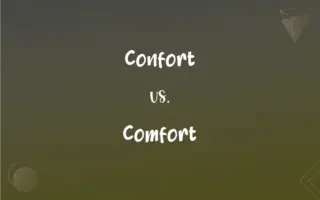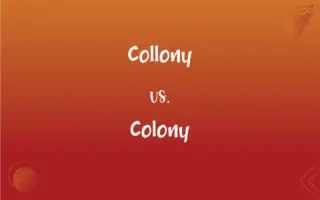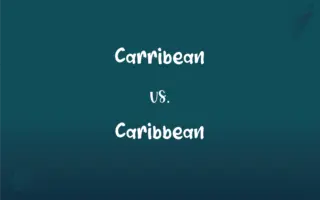Dessire vs. Desire: Mastering the Correct Spelling
Edited by Aimie Carlson || By Janet White || Published on March 29, 2024
"Dessire" is incorrect, while "desire" is correct spelling. "Desire" means a strong feeling of wanting something or someone.

Which is correct: Dessire or Desire
How to spell Desire?

Dessire is Incorrect

Desire is Correct
ADVERTISEMENT
Key Differences
Think of "desire" as "de" + "sire," where "sire" implies a creation or cause of passion.
Remember, "desire" has only one "s," signifying a single strong feeling.
Associate "desire" with "fire" to remember the intensity and the single "s."
Recall that "desire" contains "ire," often related to passion or intense feelings.
Use the mnemonic "Do Every Single Individual Really 'Equire'?" highlighting the correct spelling of "require" with "re" to remember the "re" in "desire."
ADVERTISEMENT
Correct usage of Desire
She felt a strong dessire to travel the world.
She felt a strong desire to travel the world.
Her dessire to become an artist was evident from a young age.
Her desire to become an artist was evident from a young age.
The company has a dessire to expand into new markets.
The company has a desire to expand into new markets.
They expressed a dessire to adopt a healthier lifestyle.
They expressed a desire to adopt a healthier lifestyle.
His dessire for knowledge was insatiable.
His desire for knowledge was insatiable.
Desire Definitions
A strong wish or craving.
Her desire for knowledge was insatiable.
An attraction to someone or something.
He felt a deep desire to travel the world.
To wish or want something very much.
They desire peace in their community.
The feeling of wanting to have or achieve something.
His desire for success drove him to work hard.
A request or wish for something to happen.
Her only desire was to see her family happy.
To wish or long for; want
A reporter who desires an interview.
A teen who desires to travel.
Desire Sentences
She felt a strong desire to travel the world.
Her desire to become an artist was evident from a young age.
Their desire to help others led them to volunteer abroad.
His desire for knowledge was insatiable.
They expressed a desire to adopt a healthier lifestyle.
He had a burning desire to succeed in his career.
The child's desire for a pet dog was clear to everyone.
He felt a deep desire to explore the unknown territories.
The desire to learn drove her to read extensively.
A desire for adventure took him around the world.
The desire to create something unique motivated the artists.
The desire for peace was strong among the citizens.
She couldn't hide her desire to see the new exhibit.
They shared a common desire to protect the environment.
The desire for independence sparked the revolution.
The desire for financial stability influences many career choices.
He had a simple desire for a quiet life in the countryside.
The company has a desire to expand into new markets.
A desire for social change inspired the activists.
The desire to be understood is universal among humans.
The desire for fame and recognition drives many performers.
A desire for self-improvement can lead to significant personal growth.
Her desire to win the competition was very strong.
She had a lifelong desire to write a novel.
Her desire to help the community led to the charity's foundation.
Their desire for a better future motivated them to work hard.
The team's desire for victory was palpable in the locker room.
Parents often have a strong desire to provide for their children.
The desire for knowledge is the foundation of education.
The desire to connect with others is at the heart of social media.
Desire Idioms & Phrases
Heart's desire
This means something one very much wants or wishes for.
Winning the championship was their heart's desire.
Desire lines
These are paths created over time by the natural walking habits of people, often indicating a preferred or desired route.
The desire lines through the park showed where people naturally wanted to walk.
A burning desire
This is used to describe a very strong and passionate wish or need.
He had a burning desire to make a difference in the world.
The desire path
Similar to desire lines, this is a path created by people choosing the most efficient or comfortable route.
The desire path through the field was shorter than the paved sidewalk.
Fulfill a desire
This means to satisfy a wish or need.
His trip to the mountains fulfilled his desire for solitude.
Desire of the heart
This refers to a deep, emotional wish or longing.
To travel the world was a desire of her heart.
To have a strong desire
This means to possess a powerful wish or longing for something.
She had a strong desire to learn new languages.
Desire to please
This is the wish to make others happy or satisfied.
He had a natural desire to please, always going out of his way to help.
Desire for approval
This refers to the wish to be accepted or validated by others.
Her desire for approval sometimes made her too cautious in her decisions.
Object of desire
This refers to something that a person strongly wants to have or achieve.
The rare painting became the object of desire for many collectors.
Desire for knowledge
This is the wish to learn, understand, or discover more about something.
His desire for knowledge about the cosmos led him to study astronomy.
Desire for change
This refers to a wish or need for something to become different.
The community's desire for change led to the development of new public spaces.
FAQs
What is the pronunciation of desire?
Desire is pronounced as /dɪˈzaɪər/ or /dɪˈsɪər/.
What is the verb form of desire?
The verb form is "desire."
Which vowel is used before desire?
The vowel "e" is used before "desire" in the prefix "de-."
What is the singular form of desire?
The singular form is "desire."
What is the root word of desire?
The root word is "desiderare" from Latin.
Which preposition is used with desire?
"For" is commonly used with "desire," as in "desire for something."
What is the plural form of desire?
The plural form is "desires."
Is desire an adverb?
No, "desire" is not an adverb.
Is desire an abstract noun?
Yes, "desire" is an abstract noun.
Why is it called desire?
It is called "desire" from the Latin "desiderare," meaning to long for or wish for, reflecting a deep craving or longing.
Which conjunction is used with desire?
"And" can be used when listing multiple desires.
Is desire a noun or adjective?
"Desire" is primarily a noun but can also be a verb.
Is the desire term a metaphor?
"Desire" can be used metaphorically to represent strong feelings or wishes.
What is a stressed syllable in desire?
The second syllable, "sire," is stressed.
What part of speech is desire?
"Desire" is both a noun and a verb.
What is the opposite of desire?
"Indifference" or "aversion" are opposites of desire.
What is the second form of desire?
The second form is "desired" (past tense).
What is the third form of desire?
The third form is also "desired" (past participle).
Which article is used with desire?
"The" or "a" can be used, depending on the context.
Is desire a vowel or consonant?
The word "desire" starts with a consonant.
Is desire a countable noun?
Yes, "desire" can be counted (e.g., many desires).
Is the word desire imperative?
"Desire" can be used in imperative sentences (e.g., "Desire success!"), but it is not inherently imperative.
What is another term for desire?
"Longing" or "yearning" are other terms for desire.
What is the first form of desire?
The first form is "desire" (as a verb, present tense).
Which determiner is used with desire?
Determiners like "the," "a," "my," or "her" can be used with "desire."
How is desire used in a sentence?
"She expressed a strong desire to start her own business."
Is desire a negative or positive word?
It is neutral, contextually positive or negative based on its use.
Is desire a collective noun?
No, "desire" is not a collective noun.
How many syllables are in desire?
There are two syllables in "desire."
How do we divide desire into syllables?
"De-sire."
About Author
Written by
Janet WhiteJanet White has been an esteemed writer and blogger for Difference Wiki. Holding a Master's degree in Science and Medical Journalism from the prestigious Boston University, she has consistently demonstrated her expertise and passion for her field. When she's not immersed in her work, Janet relishes her time exercising, delving into a good book, and cherishing moments with friends and family.
Edited by
Aimie CarlsonAimie Carlson, holding a master's degree in English literature, is a fervent English language enthusiast. She lends her writing talents to Difference Wiki, a prominent website that specializes in comparisons, offering readers insightful analyses that both captivate and inform.


































































